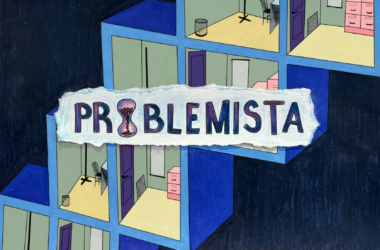 Emily Doyle / Players’ Theatre
Emily Doyle / Players’ TheatreDark comedy is a perplexing concept. Though initially a contradiction in terms, most people understand the subtlety involved in such a label. The work may make upsetting issues “lighter”; perhaps, conversely, it may convey typical subjects of comedy in acidic, disturbing ways. In both of these interpretations, there’s a little guilt attached to our laughter, and a bit of awkwardness about the comedy. Some things just shouldn’t be funny, and yet they are.
Christopher Durang’s The Marriage of Bette and Boo, through the nuances of the script, makes us feel that uneasiness with our laughter. But, despite commendable efforts, the Players’ Theatre production, directed by Jordana Deutsch and Benjamin Sher, often elicits unintended discomfort from the audience by missing those nuances.
The play, narrated by Matt (Aaron Neishlos), tells the story of his two unfortunate parents, Bette (Kara Rosen) and Boo (James Kelly), and their immediate families. Made up of roughly 33 quick scenes in no particular chronological order, it recounts various episodes of their lives from their wedding day to death, chronicling tragic yet humorously blithe incidents of alcoholism, verbal abuse, spousal tension, mindless Catholic devotion, and even five stillbirths.
With these scenes coming in quick succession, interrupted periodically by Matt’s intellectual monologues, the play gets confusing, and sometimes it’s hard to see where it’s going—or where it’s coming from. That is often the point; as these various scenes accumulate, one appreciates a general sense of dysfunction in Matt’s family that somehow transcends time and place. Matt describes his family quite succinctly: “Meaning well isn’t enough.” Every single one of his family members has a quirk, a fundamental flaw that is incompatible with everyone else. Whether it’s from an altercation between his nervously devout Catholic aunt Emily (Hannah Siden) and cynical aunt Joan, or his alcoholic grandfather Karl (Caleb Harrison) treating his wife worse than he would a bartender at last call, one can only echo Matt’s defeated chuckle.
Because of the mishmash of scenes, the direction of the play is hard to place. While the first and last scenes frame the play in a classic dramatic fashion, what happens in the middle seems like a maze.
Unfortunately, this production lacks a concrete development to help assuage the confusion. After an hour, the play quickly loses steam. Once one understands the dysfunction, the quirks, and flaws of Matt’s family, and the despondent nature of his parents halfway through the play, it doesn’t have anywhere to go. The script is written flatly. Since the scenes are jumbled, it’s up to an interesting interpretive production to bring nuanced shape to the “story.” The characters, though intriguingly despicable, are no longer interesting after an hour. One court scene, for example, draws out a joke of an incomprehensible lawyer to awkward lengths; Bette’s hysteria loses intrigue; Boo’s flat acting fails to warrant sympathy.
Many of the actors also seem like they were talking at, rather than with, each other. Though this is sometimes necessary to convey the miscommunication between family members, the characters nonetheless recite some of their lines in a vacuum that obscures genuine conversation.
Furthermore, due to the number of scenes, quick transitions are absolutely necessary. Though this was done with relative ease, due to the space and limited resources, watching characters set up scenes for others was distracting. With the flow of the play occasionally interrupted by these awkward transitions, the lack of shape seemed even more apparent.
That said, some of the actors made the play more enjoyable. Aunt Emily’s nervousness and perpetual guilt is tangible through her wide eyes and nervous stuttering. Taylor Lowery as Grandma Soot (whose name’s origin is hidden in comedic obscurity) was hilariously perfect. Max Lanocha as the oddly sardonic Father Donally and callous doctor brought genuine laughter to every scene of his (I’ve never seen such a fine impression of bacon).
This play, though a very interesting work, is a difficult one to execute. Despite laudable efforts, it requires nuanced efficiency that is hard to find in this production.
The Marriage of Bette and Boo runs from Nov. 23-27 at Players Theatre. Tickets are $6.








